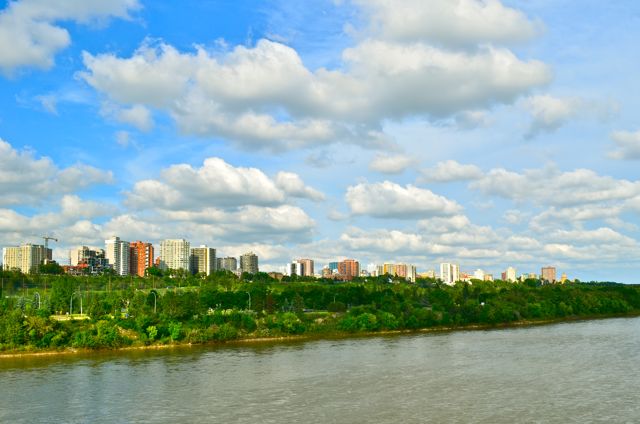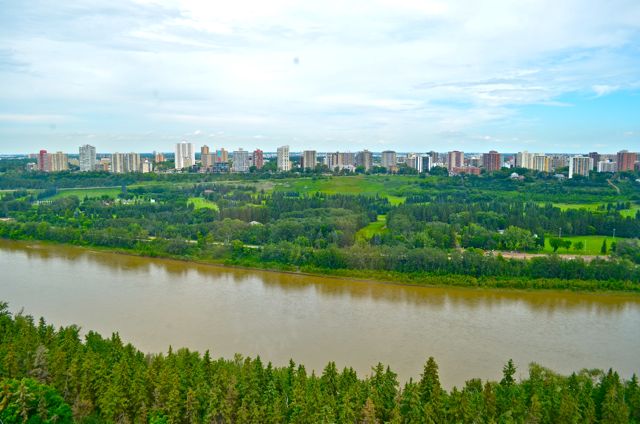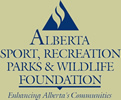
Edmonton has the most extensive stretch of urban parkland in North America, home to many species of urban wildlife. Check out the WildEdmonton project, a collaboration of the St. Clair lab, the City of Edmonton, and the Urban Wildlife Information Network, to see the mammals we’ve detected on remote cameras in Edmonton.

The Project
The Edmonton Urban Coyote Project began in 2009 in the lab of Dr. Colleen Cassady St. Clair, Professor of Biological Sciences at the University of Alberta. The project addresses rising reports by people of conflict with coyotes that are occurring in Edmonton and other cities across North America. Colleen and her students work collaboratively with the City of Edmonton and Animal Damage Control to research both causes of and solutions for human-coyote conflict. We also engage members of the public to observe coyotes, participate in our research projects, and support sustainable coexistence with coyotes and other urban wildlife.Our goal
We aim to conduct research and provide information that will promote coexistence between people and wildlife. Successful coexistence will maximize the ecological benefits of coyotes in Edmonton, which include control of prey species, scavenging of carrion, dispersal of plant seeds, and other ecosystem functions. Successful coexistence will also minimize the need for contentious lethal management of coyotes while maintaining security for people and their pets and aesthetic enjoyment of nature.What we do
We study the habitat use, movement, behaviour, diet, physiology, and parasites of coyotes. Our methods have included GPS collars, remote cameras, scat collection, snow tracking, carcass examination, behaviour modification, and direct observations by people. Our collaborative research has supported 2 Ph.D. students, 5 M.Sc. students and dozens of undergraduate students to date. You can read more about our current and past research under "Research" and find all the publications associated with the St. Clair Lab here.Volunteer Opportunities
Edmontonians have contributed over 10 000 observations to help us understand urban coyotes and we appreciate every single report! If you observe a coyote, please let us know by following the instructions provided at left under "report a sighting". We use this information to identify clusters of coyote activity where education or mitigation may be needed. We also integrate these observations with other kinds of data to understand sources of conflict and opportunities to reduce it. We are especially interested in reports of coyote denning behaviour, which is being studied by current Ph.D. student, Sage Raymond. Reach out to us at coyotes[at]ualberta.ca if you’d like to know about current volunteer opportunities. Over the past 16 years, Volunteers have made tremendous contributions to our work by collecting and analyzing scat, reporting observations of coyotes, helping to analyze remote photos, and participating in the aversive conditioning study. Thank you, Edmontonians, for your wonderful help with our work!Our Funders
We are grateful to all the people and organizations who make our work possible. Current and past funders include the Alberta Conservation Association, the Alberta Ecotrust Foundation, the Alberta Minister Special License Auction Grants, the Natural Sciences and Research Council of Canada, the Canadian Wildlife Foundation, The Royal Alberta Museum, and the Alberta Sport, Recreation, Parks, and Wildlife Foundation. We appreciate additional in-kind support from Animal Damage Control and the City of Edmonton.We welcome funding for current project components that (a) use remote cameras to assess coyote behaviour, (b) estimate rates of parasite infection for coyotes with different patterns of habitat use and association with people, and (c) explore correlates of conflict and coexistence with coyotes. If you would like to provide financial support for our research, you can do so here.
Thank you for visiting our site! We welcome your questions and comments at coyotes@ualberta.ca









